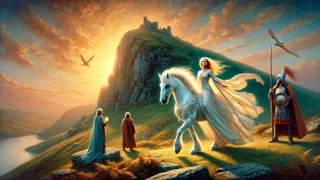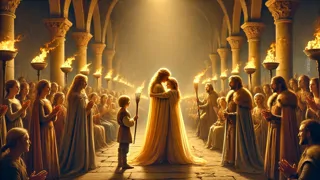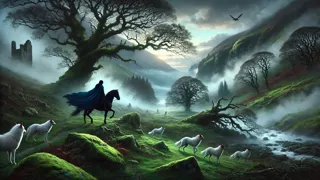Introduction
In a land where the hills hummed with memory and the mists clung to stone as tales to the hearth, Dyfed of ancient Wales was a realm at the edge of wonder. Here, beneath chill drizzle and brilliant green, Pwyll ap Dyfed, young prince and leader, hunted amid whispering forests and wandered in meadows crossing thresholds between worlds. His eyes, storm-grey and thoughtful, took in the subtle magics that flickered in the corners of mortal sight—enchanted hounds whose coats gleamed like snow, sudden silences in the woods, and old oaks grumbling secrets to the wind. The people of Dyfed honored their prince for kindness and steady hand; yet in Pwyll burned a restlessness that would one day call him from his seat at Arberth to tasks larger than deer-stalking and noisy feasts. His story—one of honor, humility, and the uncanny—echoes through Welsh valleys, rising in song and legend: for Pwyll’s destiny entwined with Annwn, the Otherworld of perpetual twilight, where the boundary between mortal and divine bent as reeds beneath a river’s glass.
The tale begins not in a hall crowded with praise, but in silence: Pwyll riding out alone, mist streaming about his horse’s legs, accompanied only by the sigh of ancient land. By chance—though such things are never mere accident in the woven loom of myth—Pwyll glimpsed a pack of hounds, their pelts whiter than moonlit snow, their ears blood-red, hunting a stag in the depths of Glyn Cuch. These were not hounds of human breed but of Annwn, and seizing the quarry from their jaws, Pwyll set in motion a fateful meeting. Thus appeared Arawn, lord of Annwn, clad in shadow and kingly sorrow. Their encounter, born of Pwyll’s error in trespass, would bind their fortunes: “You have brought me ill, Prince Pwyll, but if your honor can prove true, there may yet be amends.” This night, the gates to another world swung open, and Pwyll—given the chance to redeem both honor and soul—agreed to an exchange beyond any game of chance. For a year and a day, he would wear Arawn’s form and rule Annwn, facing the dread Hafgan in battle; in return, the lord of Annwn would bear Pwyll’s visage and kingship in Dyfed. Thus began the journey through magic and morality, loneliness and courage, plunging Pwyll into a spiral of wonder, ordeal, and ultimately love, for in the unwinding of this tale came Rhiannon, a woman of mystery and grace who drew Pwyll toward fate’s true purpose.
The Compact of the Otherworld
In the hush of Glyn Cuch’s deep forest, where sunlight filtered through canopies crowded with the memory of druidic chant, Pwyll dismounted, his footsteps hushed by velvet moss. The hounds—neither hostile nor welcoming—watched with ancient wisdom. As Pwyll stooped above the stag, a windless silence fell, broken by the sudden, regal stride of Arawn, Lord of Annwn. Clad in shadow-rich robes, Arawn’s features were solemn, kingly yet inhuman, eyes like pools that held the light of dusk.

Arawn’s voice echoed softly: “Prince of Dyfed, you have trespassed upon my hunt and claimed what is mine.” Pwyll’s heart stuttered in his chest—he knew tales of the Otherworld, knew gifts could be curses and wrongs required answer lest worse befall a king’s house. Drawing himself to full height, Pwyll offered apology, bowing with sincerity. “If I have brought you ill, noble lord, let me atone as your honor deems worthy.”
Arawn’s reply came measured and strange: “Your words weigh true, young prince. A test then, I offer you. My enemy, Hafgan, rival king of Annwn, has long plagued my realm. For a year and a day, you shall live as me—my countenance, my power, my honor—while I take your place in Dyfed. At the year’s end, you shall meet Hafgan in single combat, and what passes then, let fate decide.”
With solemnity, the pact was made. Chill swept the glade as forms shifted—Pwyll’s vision blurred, senses twined together—and in that crossing, he found himself as Arawn, lord of a realm where night never waned to full day. Annwn’s halls were of silver and moonstone, its lands forever twilight, peopled not by mortals but by ageless folk who looked at him with mixture of awe and curiosity.
For a year and a day, Pwyll ruled Annwn with care, learning justice and war in a court where ambition moved in silence. Arawn’s consort, ethereal and wise, tested his restraint: each night he slept chaste and distant, loyal lest he betray his host’s trust. His heart grew heavy with homesickness and the eerie calm of that magic land.
At the final dawn, Hafgan strode with thunder to the appointed glade. Battle snapped the air as sword rang on sword. Remembering Arawn’s words—"strike but once, and only once, to end what is long overdue"—Pwyll dealt a single, mighty blow. Hafgan fell, peace heralded by wind among trembling leaves. Annwn’s folk rejoiced: a year of justice, a day of destiny. Pwyll and Arawn, their pact fulfilled, exchanged faces and places once more. Before parting, Arawn spoke: “You have shown honor where many would have failed. Our friendship shall be legend in these lands.”
Returning at last to Dyfed, Pwyll found his own household flourishing, well-governed by Arawn. Both men discovered that in knowing one another’s burdens, compassion grew, and with it, peace. Yet the story was only beginning—for another fate awaited the prince beneath Arberth’s ancient hill.
The Enchantment of Rhiannon
Seasons wheeled, Dyfed’s valleys blushed with wildflowers, yet suspense clouded Prince Pwyll’s heart. One afternoon, the court assembled atop Arberth’s ancient mound, a place woven with prophecy; there, to sit in stillness was to invite fate. As sunlight melted over heather and stone, a marvel appeared: a woman astride a pale mare, riding unhurriedly across the plain. Robed in gold and blue, Rhiannon shimmered with a beauty untouched by sorrow or shadow. Her hair flowed like a river spun of sunbeams, eyes deep as night’s promise. None could catch her—riders galore dashed after, but her steed glided away, always just out of reach, yet never hurried.

The mystery deepened each day Rhiannon returned, distant but beckoning. On the third day, Pwyll himself rode out and called gently, “Lady, for the sake of him you come to seek, pause awhile and speak!” At his words, Rhiannon halted, her smile enigmatic yet inviting. She revealed her name and purpose: “They would have me wed another—Gwawl, a man unsuited to my heart or hope. But I have chosen you, Pwyll, for your name reaches beyond mortal boundaries.”
Thus did courtship unfold, Rhiannon’s wisdom and grace guiding Pwyll through puzzles clever and sweet, for Annwn’s magic danced in her every glance. Their vows were set for a year and a day hence. Yet, on the evening of their betrothal feast, Gwawl, cunning and ambitious, concealed in the throng, demanded Rhiannon as his prize through a trick of words and ritual. Bound by honor and the customs of hospitality, Pwyll could not refuse, and Rhiannon was sorely taken. Hope seemed lost as Gwawl claimed her—until Rhiannon, ever clever, plotted their salvation.
The following year, Pwyll attended the new feast masked as a beggar. He begged Gwawl for a gift—a seemingly humble request for enough food to fill a magic sack. But the sack, woven with Rhiannon’s own magic, could never be filled save by Gwawl himself stepping inside. When the unsuspecting rival obliged, Pwyll’s companions leaped forth, binding him fast. Gwawl was forced to forswear Rhiannon and depart in shame. Victorious, Pwyll and Rhiannon at last joined hands; joy lit Dyfed’s hills, their union a marvel of cunning loyalty and partnership. Rhiannon’s insight and Pwyll’s humility forged a legacy that would echo through generations.
The Testing of Fate and Birth of Legacy
For a time, peace enveloped Dyfed. Pwyll and Rhiannon ruled with wisdom, their hall echoing with laughter and learning. But myth is restless, and soon sorrow crept through the stones. Their long-awaited child vanished on the night of his birth, spirited away as if by unseen hands. Rhiannon’s maids, fearful and ashamed, accused her of monstrous infanticide, hiding their own neglect by scattering damning words. The lord’s court, shaken, listened in disbelief. Yet Rhiannon, proud and unbowed, neither fled nor wailed. She accepted the appointed penance: for seven years she sat by the gate, bearing upon her back all who entered, telling her tale of woe and protest, though her eyes never dimmed with hope. Pwyll stood by her, unbroken by rumor, and Dyfed’s people watched and waited.

Away in a distant field, Teyrnon Twrf Liant, lord of Gwent, had also faced the sorrows of mysterious loss—a colt stolen each spring by shadowy force. That same night, the answer crept to his hands: he rescued not a foal, but a shining infant, clinging to the colt’s golden mane. Teyrnon and his wife, childless and filled with wonder, fostered the boy, naming him Gwri Golden Hair for his radiant locks. He grew with uncanny speed and strength, the mark of Annwn upon him.
As years unfolded, Teyrnon discerned the likeness of the child to Pwyll and Rhiannon. Compassion moved him to reveal all: with great joy, he restored the boy to his true parents. Reunited, Pwyll and Rhiannon named their son Pryderi, he who brings resolution to sorrow. With this return, Rhiannon’s ordeal ended, her honor vindicated and her wisdom celebrated anew. Laughter and music returned to Dyfed’s halls, legends kindling at every hearth. The bond between mortal and otherworldly, once born of mistake and penance, became a harmony shaping the fate of Wales.
Conclusion
So closes the First Branch of the Mabinogi, where fates cross as rivers in the twilight and the wisdom of repentance, loyalty, and love unsnarls even ancient doom. Pwyll, humbled and strengthened by magical trial, learned to rule not just with might but with a listening heart. Rhiannon stood as proof that dignity and cleverness can shape justice even under suspicion. Their son’s return marked a healing for Dyfed and a lesson echoing through Welsh lore: that suffering endures for a season, but the bonds of devotion—between worlds, between kin—renew what has been lost. As the land blossomed anew, the legend of Pwyll, Prince of Dyfed, grew into the roots of the hills and streams, promising every heart that wonders always wait at the thresholds of courage and truth.


















